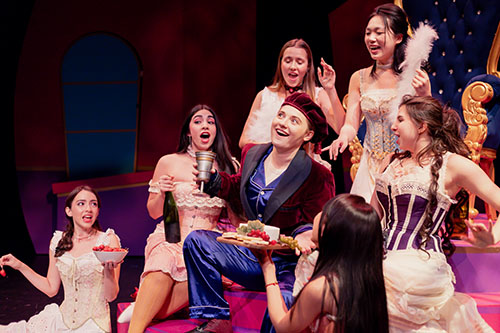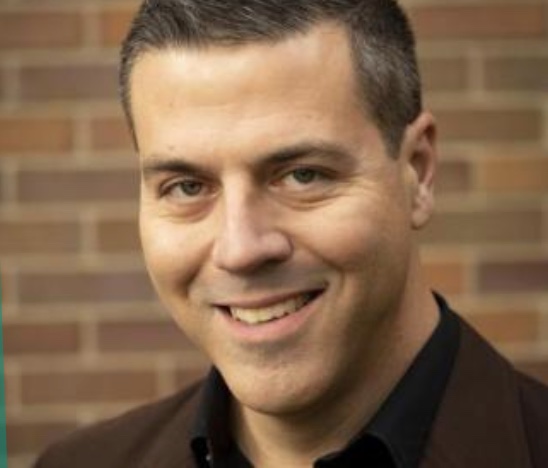by Mike Telin

On Saturday, November 16 at 7:00 pm, CIM Opera Theater will present Chabrier’s comic opera at Westfield Studio Theatre in Playhouse Square, sung in French with English dialogue. Harry Davidson conducts the CIM Orchestra. The production will be repeated on Sunday at 3:00 pm. Tickets are available online.
Unabashedly silly? Here’s what happens.
It’s King Ouf’s birthday! But one thing is missing to make it a truly great occasion: a public execution. Everyone in his kingdom has behaved too well this year. The king’s spirits are lifted, however, when a young peddler arrives and insults him. But to his disappointment and anxiety, King Ouf learns that his fate and the peddler’s are connected in “the stars.”
“Audiences found L’étoile a bit strange when it premiered in 1877,” Hudson said. “It doesn’t really fit the mold as set by Offenbach and other composers of operetta. In many ways the music is so sophisticated that the audiences may have had a little trouble understanding the intent of the work. But it’s precisely that quirkiness and sophistication that make it a great show.”
Hudson noted that for all its silliness, L’étoile has a tighter story than a lot of well-known and beloved operas. “It’s extremely well-constructed, and really takes some twists and turns along the way.”
King Ouf’s name translates to ‘King Fool,’ and he rules over a very weird kingdom.
Most of the characters are outsiders — the peddler, and a straggling quartet — and a comedy of errors ensues when they enter his realm and find themselves in strange predicaments because of his foolishness.
“One of the things that I love is that the show takes place over the course of 24 hours around the King’s birthday. But he’s a narcissist. He doesn’t see beyond his own needs. And he’s willing to sacrifice the people of his kingdom or goad them into something that would fulfill his need to have an adequate birthday celebration,” Hudson said.

Because the Opera is not set in any particular place beyond King Ouf’s kingdom, it does allow for a latitude of thinking when it comes to setting it in a place and time. But as a director, Hudson said that he cannot divorce the sound of the music from the visual landscape.
“I need the two to be in dialogue and this music is so quintessentially late 19th century French, for the audience’s sake and for the actors’ sake, I want the visual and aural to go together in a meaningful way. So we’re taking a late 19th century approach.”
What are Hudson’s thoughts about Chabrier as a composer? “Speaking as a stage director, and giving my input as someone who looks at a composer’s ability to write for the stage, I think he’s brilliant. He gives so much detail in terms of dynamics and articulations, and he’s so good at capturing the moment and making it humorous. As a matter of fact, François Germain, who’s been working with the students, has been pointing out that the misplaced accents on wrong French words aim to make the comedy even more funny. So while Chabrier may or may not be the most brilliant composer of music, I find him to be a brilliant composer of musical stage works.”
Although L’étoile has received its share of performances at universities and conservatories during the last three or four years, Hudson is certain that its popularity is about to increase.
“We commissioned Michael Borowitz, who is a CIM alum and music director at LSU Opera, to make a chamber reduction of the score. He’s made a 10-person arrangement for string quintet, woodwinds, and percussion that will work beautifully in a black box space, which we have at Playhouse Square.”
The production features a scenic design by Jerome Wills, lighting design by Dave Brooks, and costumes by Esther Haberlen, costume director of Great Lakes Theater.
The students had the opportunity to go down to Playhouse Square for their fittings in Esther’s shop. She’s just knocked herself out on some of the most beautiful costumes that we’ve seen in a while. Jerome Wills teaches at the University of Louisville, so he builds the sets there and brings them up to us. We’ve grown our design team a bit which I’m very excited about, and so are the students.”
Hudson said that while everyone is looking forward to returning to Kulas Hall after the renovation, “I am so excited that our students have an opportunity to sing in a variety of spaces this year, like a Black Box Theater, which they’ll be doing in their careers after they leave CIM.
Published on ClevelandClassical.com November 12, 2024
Click here for a printable copy of this article


